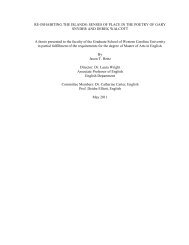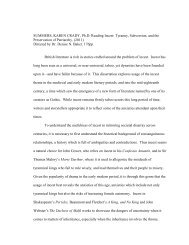THE DEVELOPMENT OF EXECUTIVE FUNCTION IN EARLY ...
THE DEVELOPMENT OF EXECUTIVE FUNCTION IN EARLY ...
THE DEVELOPMENT OF EXECUTIVE FUNCTION IN EARLY ...
Create successful ePaper yourself
Turn your PDF publications into a flip-book with our unique Google optimized e-Paper software.
consciousness are brought about by a functional process of reflection or reentrant signaling that allows<br />
subjective experiences at one level to become objects of reflection at a higher level (cf. reflective abstraction;<br />
Muller, Sokol, & Overton, 1998; Piaget; 2001; psychological distancing; DeLoache, 1993; Dewey, 1931/1985;<br />
Sigel, 1993). Each degree of reflection has specifiable consequences for the quality of experience, the potential<br />
for recall, the complexity of explicit knowledge structures, and the possibility of cognitive control (e.g., Zelazo,<br />
in press).<br />
REMA<strong>IN</strong><strong>IN</strong>G QUESTIONS AND CHALLENGES<br />
We believe that CCC theory, and especially CCC-r theory, provides a comprehensive account of current<br />
research on the DCCS. However several researchers (e.g., Kirkham et al., in press; Munakata & Yerys, 2001;<br />
Perner et al., 1999; Towse et al., 2000) have challenged various aspects of the theory. It may be useful to<br />
consider the most common challenges in turn, as many of them are based on misconceptions regarding what it<br />
is that CCC theory claims.<br />
How Could Children Learn the Rules the CCC Theory Claims Children Use?<br />
Perner (2000; see also Perner et al., 1999) criticized the application of CCC theory to theory of mind tasks,<br />
suggesting that the rules identified by CCC theory "cannot be the rules that children bring to bear on the task,<br />
because these rules could only be known after a practice run or as a result of the child having figured out the<br />
problem" (p. 382). According to CCC theory, however, it is not that children must learn rules, but rather that<br />
they must formulate rules in an ad hoc fashion basically, they need to talk their way through the problem in a<br />
way that allows them to access the appropriate piece of knowledge at the moment of responding. For example,<br />
in a false belief task, children must say to themselves something along the lines of, "There are sticks in the<br />
box, not crayons, but I'm being asked about my friend, so the answer is crayons, not sticks." Developmental<br />
constraints on the complexity of one's rule formulations determine task difficulty.<br />
CCC Theory Analyzes Task Complexity in an Arbitrary Way<br />
Another objection to CCC theory concerns the apparently arbitrary way in which task complexity is analyzed.<br />
To illustrate this objection, Perner (2000) provided an alternative analysis of the false belief task according to<br />
which it requires a simple pair of rules, rather than a higher order rule for integrating two incompatible pairs of<br />
rules. It should be noted, however, that CCC theory does not attempt to provide a logically necessary analysis of<br />
the false belief task or any other task. Instead, it generates empirical hypotheses regarding the rules children<br />
formulate and use when solving a particular problem such as the DCCS. Any given two-choice discrimination,<br />
including the false belief task (i.e., false belief response vs. reality response), is amenable to analysis in terms of<br />
a simple pair of rules. However, the CCC theory holds that the psychological perspectives identified in this task<br />
(i.e., the child's correct perspective vs. the other person's false perspective) serve naturally as setting conditions<br />
for a higher order rule. Thus, the empirical claim is that, when solving the task, one first determines from which<br />
perspective to reason, and then determines which judgment to make from that perspective. This claim receives<br />
empirical support from the current findings together with previous research showing that performance on the<br />
DCCS is correlated with performance on false belief (e.g., see Perner & Lang, 2001), although further work on<br />
this topic is clearly required.<br />
The Abulic Dissociations Predicted by CCC Theory Are Only Apparent<br />
According to the CCC theory, there are several age-related increases in the complexity of the rules children are<br />
capable of formulating and maintaining in working memory. Each increase permits children to exercise a new<br />
degree of control over their environment and behavior, but children are subject to limitations that cannot be<br />
overcome until yet another level of complexity is achieved. Abulic dissociations occur (under certain<br />
conditions, such as when there is conflict among rules) until incompatible pieces of knowledge are integrated<br />
into a single, more complex rule system via another degree of reflection. In the absence of integration, the<br />
particular piece of conscious knowledge that controls behavior is determined by relatively local associations
















